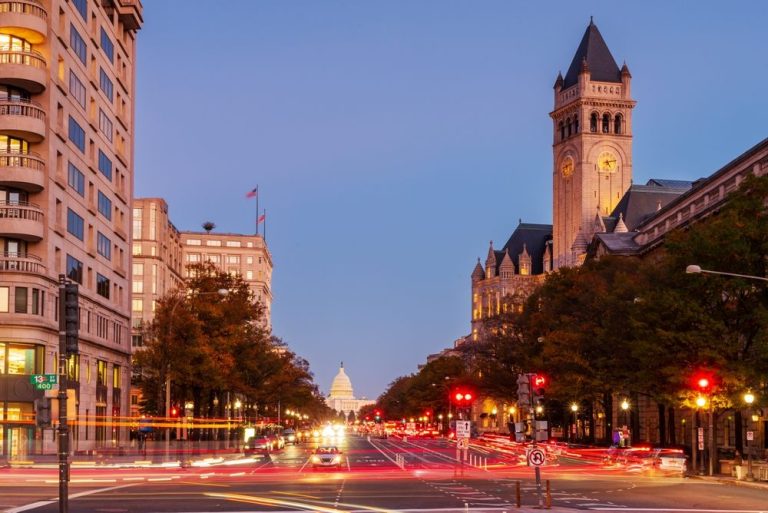This month in Washington, D.C., more fallout from the SEC’s proposed climate disclosure reporting rule, new FTC rule bans employers from using noncompete contracts for most employees, the latest from China, and more. Read on for insights and analysis about developments in Washington that could have an immediate and long-term impact on your business.
What’s Next In Washington
- Congress Is All But Done Legislating For The Rest of 2024 – As the Senate prepares to tackle the reauthorization of the Federal Aviation Administration (FAA), it is clear that this is one of the last must-pass bills before November’s elections. While members will work to attach a broad series of unrelated bills (from compensation for the victims of nuclear waste exposure to the Kids Online Safety Act to giving legal marijuana businesses more access to financial institutions to a bill on credit card swipe fees), the key takeaway is that high-profile hearings and investigations will replace the passage of legislation in Congress for the remainder of the year.
SEC
- Climate Change Reporting Rule Fallout Continues – The Securities and Exchange Commission (SEC) paused the implementation of its new climate disclosure rule amid a slew of legal challenges to the agency’s statutory authority that have been consolidated in the U.S. Court of Appeals for the Eighth Circuit. Emphasizing this is a pause – and not a withdrawal of the rule – the SEC noted: “In issuing a stay, the Commission is not departing from its view that the Final Rules are consistent with applicable law and within the Commission’s long-standing authority to require the disclosure of information important to investors in making investment and voting decisions. Thus, the Commission will continue vigorously defending the Final Rules’ validity in court and looks forward to expeditious resolution of the litigation.”
- Separately, Republicans on the House Financial Services Committee voted along party lines (28-22) on a bid from Rep. Bill Huizenga (R-Mich.) to overturn the climate risk reporting rule, with Democrats opposing.
- ESG Fund Disclosure Rules Sought – Nineteen financial reform advocacy groups, labor unions, and others led by Americans for Financial Reform Education Fund urged the SEC to push ahead with its ESG fund disclosure rule, pending some changes. In a letter, the groups argue the SEC should give ESG-focused investment funds more flexibility to determine what information they disclose to investors. But they say ESG-focused funds that consider greenhouse gas emissions in their investment calculus should need to disclose them – with the protection of a legal safe harbor for “good faith” disclosures.
- Insider Trading Definition Expanded – With a federal jury’s guilty verdict against the former head of business development at a biopharmaceutical company, the concept of “shadow trading” has vastly expanded the definition of insider trading. In this case, the executive was found to have committed insider trading when he bet on a competitor’s stock, believing the shares would rise when news about his own company hit the market.
FTC
- Noncompete Agreements: Approved & Litigated – With a party-line 3-2 vote, the Federal Trade Commission (FTC) banned employers from using noncompete contracts to prevent most workers from joining rival companies, achieving a policy goal that is popular with labor– and prompting litigation filed by the S. Chamber of Commerce, the Business Roundtable, among others. The measure marks the first time in more than 50 years that FTC officials have issued a regulation to mandate an economywide change in how companies compete. As passed, the rule prohibits companies from enforcing existing noncompete agreements on anyone other than senior executives. It also bans employers from imposing new noncompete contracts on senior executives in the future. The FTC rule isn’t set to go into effect until 120 days from the day it is published in the Federal Register. So likely not before September. But that effective date could be postponed if the federal courts in Texas – or any other courts where suits are filed – decide to grant a stay or preliminary injunction.
- Health Breach Notification Rule Changes Finalized – The FTC finalized changes to the Health Breach Notification Rule (HBNR), updating the rule by clarifying its applicability to health apps and other similar technologies and expanding the information that covered entities must provide to consumers when notifying them of a breach of their health data. The Commission identified eight key changes, with the two Republican Commissioners dissenting.
- New Rule Prohibiting AI Impersonation Approved – The FTC implemented a new rule regarding government and business impersonation that also prohibits the use of AI to impersonate individuals. With this rule, the FTC will be able to hold accountable the entities that supply the tools and resources for creating fraudulent impersonations. The FTC said that losses due to these impersonation scams topped $1.1 billion for the year, more than three times what consumers reported in 2020. The new data spotlight reveals the five most commonly reported ways that government and business impersonators convince consumers to turn over their hard-earned money: copycat account security alerts; phony subscription renewals; fake giveaways, discounts, or money to claim; bogus problems with the law; and made-up package delivery issues.
- Post-Antirust Review Deadline Scrutiny Still Possible – The FTC sent warning letters to hundreds of companies, including Pfizer, Baxter International, and Thermo Fisher Scientific, cautioning them that their acquisitions could face challenges even after the FTC’s antitrust review deadline has passed. These warnings, termed “close-at-risk” letters, were sent between June 2021 and July 2022, and were uncovered by a Bloomberg investigation. The FTC, led by Chair Lina Khan, initiated this practice due to a surge in merger filings, aiming to regulate the overwhelming number of deals amid resource constraints.
Justice Department
- Private Equity Merger Disclosures Scrutinized – The Department of Justice (DOJ) is investigating whether some private equity companies may have intentionally withheld information in previous mergers, according to Bloomberg. Richard Mosier, former special counsel for private equity in the DOJ’s Antitrust Division, said the agency has “renewed focus” on making sure private equity firms comply with the Hart-Scott-Rodino (HSR) Act, which requires companies to notify antitrust enforcers of their transactions.
Treasury Department
- Stock Buyback Tax Rules Released – With 600-pages of proposed regulations, the Treasury Department outlined how the stock buyback tax will work. These rules detail how to calculate the levy, created by Democrats almost two years ago, as well as how to report and pay the one percent tax. The rules explain what counts as a stock repurchase for purposes of the tax, as well as which other similar transactions are also subject to the charge. Among those: buybacks that happen as part of certain corporate mergers.
- More Power For CFIUS Proposed – The Treasury Department proposed an expansion of its authority over the Committee on Foreign Investment in the U.S. (CFIUS) review process, which determines whether commercial transactions should be approved or disapproved on national security grounds. The proposal, which comes amid intense official scrutiny on U.S.-China investment flows, calls for CFIUS to get new powers to obtain information and levy higher fines, more easily subpoena companies involved in corporate acquisitions, and to expand the types of information it can require the companies have to turn over.
Labor
- More Salaried Workers Now Eligible For Overtime – The Department of Labor (DOL) issued a new rule that raises the salary threshold under which salaried employees are eligible for overtime. The threshold will increase to the equivalent of an annual salary of $43,888, or $844 a week, starting July 1, 2024. It will increase again to $58,656, or $1,128 a week, on January 1, 2025. The DOL estimates that about 4 million more workers will qualify for overtime when the rule is fully implemented in January. In its first year, the rule is expected to result in an income transfer of about $1.5 billion from employers to workers, mainly from new overtime premiums or from pay raises to maintain the exempt status of some affected employees.
Additional Key Developments
- China
- The Department of Homeland Security announced that de minimis shipments – packages valued at $800 or less that are often sent directly to U.S. consumers – will receive heightened scrutiny, including into whether goods are being imported in defiance of a U.S. forced-labor ban. The move, part of a broader push against illicit apparel imports, comes after U.S. industry groups, unions, and lawmakers from both parties urged a clampdown. The plan will serve as the blueprint for future strengthened enforcement efforts through intensified targeting of small package shipments; joint trade special operations; increased customs audits and foreign verifications; and the expansion of the Uyghur Forced Labor Prevention Act (UFLPA) Entity List.
- Senate Majority Leader Chuck Schumer (D-N.Y.), along with six other Democratic senators, wrote to President Biden and U.S. Trade Representative (USTR) Katherine Tai urging the Biden Administration to keep or increase tariffs on Chinese goods, which are currently under review. The senators, all of whom are in swing state re-election races except Sen. Schumer, specifically mention their continued support for tariffs on Chinese steel, and also identify intellectual property, solar panels, and electric vehicles (EVs) as areas of concern.
- The Biden Administration formed a new White House Climate and Trade Task Force, noting that, according to President Biden’s Senior Advisor for Clean Energy Innovation & Implementation John Podesta, “…if the global trade of goods was its own country, it would be the second-largest carbon polluter in the world after [China].” The task force will examine how to leverage financial incentives, trade deals, and more to boost such investments in countries with stricter emissions standards.
- A number of individual states – with the most aggressive actions coming in Republican-controlled states – are advancing their own local proposals, bills, laws, and regulations that aim to block Chinese individuals and companies from acquiring land, winning contracts, working on research, setting up factories, and otherwise participating in the U.S. economy.



